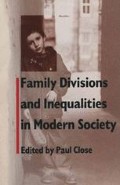Abstract
Mary Richmond is generally considered the founder of social casework in America. Unlike such contemporaries as Jane Addams and Charlotte Gilman (they were all born within one year of one another) Richmond did not participate in the idealistic currents of reform associated with settlement house work, social feminism and feminist-influenced progressivism. Instead, her career moved directly from participation in the Charity Organisation societies (from which so much of the settlement house movement broke away) to the establishment of a profession (in which so much of the settlement house movement culminated). Although not as charismatic or sympathetic a figure as Addams, Gilman, Florence Kelley or her other great ‘progressive’ contemporaries concerned with social welfare, the importance of the professions in general and social work in particular gives Richmond’s career continued significance.
Access this chapter
Tax calculation will be finalised at checkout
Purchases are for personal use only
Preview
Unable to display preview. Download preview PDF.
Notes
See the biographical entry by Muriel Pumphrey in Edward T. James, et al., Notable American Women 1607–1950 (Cambridge, Mass.: Harvard University Press, 1971).
Abraham Flexner, ‘Is Social Work a Profession?’ National Conference of Charities and Correction, Proceedings (1915) pp. 576–90
Roy Lubove, The Professional Altruist: the Emergence of Social Work as a Career, 1880–1930 (New York: Atheneum, 1969) p. 106.
Quoted in Robert Bremner, From the Depths: The Discovery of Poverty in the United States (New York University Press, 1956) p. 129.
See also Edward T. Devine, The Principles of Relief (New York: Macmillan, 1904) p. 22.
Simon Patten, The Theory of Prosperity (New York: Macmillan, 1902) pp. 228–29.
Compare Joseph Dorfman, The Economic Mind in American Civilisation, volume III, (New York: Viking Press, 1946–59) p. 184.
Charles Horton Cooley, Socialist Organisation: A Study of the Larger Mind (Glencoe, Illinois: Free Press, 1909), Angell ed., p. 29.
Ibid., p. 23: Charles Horton Cooley, Human Nature and Social Order (New York: Scribner’s Sons, 1922), p. 32.
see also George Herbert Mead, ‘Cooley’s Contribution to American Social Thought’, American Journal of Sociology, volume XXXV, March 1930, pp. 693–706.
Mary Richmond, Social Diagnosis (New York: Russell Sage Foundation, 1917) p. 367.
On ‘individuality in the sense that Richmond uses it’, see E. L. Thorndike, Individuality (Boston: Houghton Mifflin, 1911), pp. 19, 42.
Canon and Mrs. Barnett, Towards Social Reform (New York, 1909) p. 12
quoted in Allen F. Davis, Spearheads for Reform: the Social Settlements and the Progressive Movement, 1890–1914 (New York: Oxford University Press, 1967) p. 7.
See John Synge, The Aran Islands, (Boston: John W. Luce, 1911).
Richard C. Cabot, Social Service and the Art of Healing (New York: Moffat, Yard, 1909), pp.41, 47, 48
Compare Roy Lubove, The Struggle for Social Security, 1900–1935 (Cambridge, Mass.: Harvard University Press, 1968).
Charles S. Loch, ‘Some Controversial Points in the Administration of Poor Relief’ in Bernard Bosanquet, ed., Aspects of the Social Problem (London: Macmillan, 1895), quoted in Mencher, op. cit., p. 180.
Described in George Rosen, A History of Public Health (New York: MD Publications, 1958) p. 385.
Paul Dubois, The Psychic Treatment of Nervous Disorders: The Psychoneuroses and their Moral Treatment, translated and edited by S.E. Jellifee, MD, Ph.D. and W. A. White, MD (New York: Funk and Wagnalls, 1907), cited in Social Diagnosis, p. 136.
Burton Bledstein, The Culture of Professionalism (New York: Norton, 1976) p. 88.
Hannah Arendt, The Human Condition (University of Chicago Press, 1958), pp. 41–2.
Editor information
Editors and Affiliations
Copyright information
© 1989 Paul Close
About this chapter
Cite this chapter
Zaretsky, E. (1989). Mary Richmond and the Origins of Social Casework in America. In: Close, P. (eds) Family Divisions and Inequalities in Modern Society. Palgrave Macmillan, London. https://doi.org/10.1007/978-1-349-09337-3_10
Download citation
DOI: https://doi.org/10.1007/978-1-349-09337-3_10
Publisher Name: Palgrave Macmillan, London
Print ISBN: 978-1-349-09339-7
Online ISBN: 978-1-349-09337-3
eBook Packages: Palgrave Social & Cultural Studies CollectionSocial Sciences (R0)

